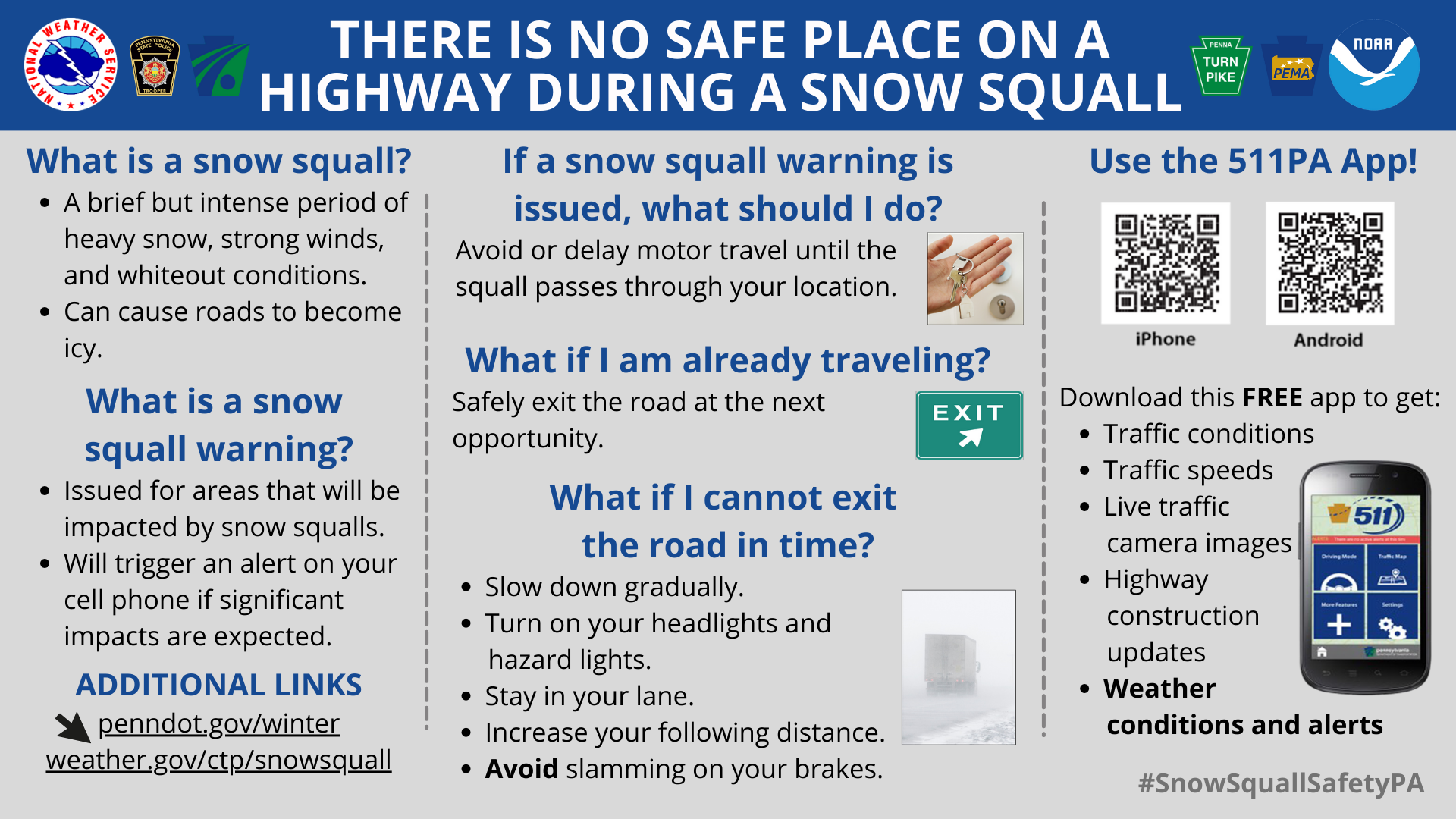Snow squalls are one of the most dangerous winter weather phenomena. Check out these tabs to know what they are, how to be safe, and where to get the necessary information to always stay weather aware!

Snow squalls are often associated with strong cold fronts and are a key winter weather hazard. Sudden whiteout conditions, gusty winds, and falling temperatures produce icy roads in just a few minutes. There is no safe place on a highway during a snow squall.
.png)
Similar to summertime thunderstorms, snow squalls often happen on days with partly cloudy skies. In a matter of minutes, a pleasant day with sunny skies can change to whiteout conditions. This is part of what makes snow squalls so dangerous.
.gif)
Snow flurries and snow showers are common in Pennsylvania, but snow squalls are an especially dangerous weather hazard. Check out this graphic to see what makes snow squalls unique - they're not just a typical snow shower

A common hazard associated with snow squalls is a “flash freeze”. Rapidly-falling temperatures along with melting snow on high-traffic roads can cause untreated highways to turn into a sheet of ice.
Heavy Snow Bursts + Flash Freezes = Extreme Impacts.

A snow squall is similar to a summertime thunderstorm with heavy precipitation in a short amount of time and strong winds. Thunderstorms can produce flooding from heavy rain, but the icy roads that result from snow squalls are often much more dangerous.
.png)
Snow squalls often catch drivers by surprise because the sky goes from clear blue to heavy snow in a matter of minutes. Learn how to identify snow squalls in the distance and exit before you drive through one: it could save your life!

For a flash freeze to occur, air temperatures must be at or below 32°F. As such, snow squalls can happen anytime between November and March.
Remember this video when snow squalls are in the forecast. There is no safe place on a highway during a snow squall.
.gif)
This year is the fourth year where we will be issuing Snow Squall Warnings throughout the winter. The National Weather Service issues Snow Squall Warnings when snow squalls are imminent. Check out this graphic or visit weather.gov/safety/winter-snow-squall to learn more!
.png)
A Snow Squall Warning is issued by the National Weather Service when hazardous travel is expected. If you are in a Snow Squall Warning, expect reduced visibility, icy roadways, and rapidly-changing conditions.

Before you hit the road this winter, monitor road conditions in real time at www.511pa.com and follow @511PAStatewide on Twitter.
Download the 511PA App for Apple or Android or visit 511pa.com for free to access traffic conditions, live traffic camera images, highway construction updates, and weather conditions/alerts.

You will receive a Wireless Emergency Alert (WEA) for a Snow Squall Warning in which snow squalls are expected to pose a SUBSTANTIAL threat to safe travel. If your phone goes off, take the Warning seriously and delay travel or exit as soon as possible!

If you’ve driven on I-80 or I-81 in PA, you may have seen Variable Speed Limit signs. They are used to quickly reduce speed limits when visibility or roadway conditions present the need for more cautious driving. If the speed limit is lowered, slow down!

When a snow squall hits, strong winds, a sudden drop in temperatures, and heavy snow bursts create very dangerous and life threatening travel. Simply put, there is no safe place on a highway during a snow squall.

When a Snow Squall Warning is issued for your location, avoid or delay motor travel until the squall passes. Even if it “looks” safe, visibility can drop within minutes! There is no safe place on a highway during a snow squall.
.gif)
When a snow squall hits, visibility can drop to almost nothing in an instant. There is no safe place on a highway during a snow squall, but what if you get stuck on the road? Reduce your speed, turn on your headlights, and don’t slam on your brakes!
.gif)
Multi-car pileups are what make snow squalls deadly. What should you do if you’re in a pileup? Whatever you do, DO NOT stand outside your vehicle on or near the roadway. Follow the guidance below from PA State Police.



.png)
.png)
Pocono Record: PEMA, police, NWS advise drivers to stay off the roads during snow squalls
https://news.yahoo.com/pema-
Patch.com: Snow Squalls Pose Deadly Dangers, Safety Officials Say
https://patch.com/
Fox56 & CBS21: Wolf Admin Provides Information on Snow Squall Alerts and Safety Guidance
ABC27 & WJET/WFXP: Wolf administration gives advice on snow squall alerts and safety guidance
Times-Leader: State provides information on snow squall alerts, safety guidance
Berks Weekly: PEMA, NWS, State Police, highlight dangers of Snow Squalls ahead of winter season
The Progress: Snow squall alerts and safety guidance issued during Snow Squall Awareness Week
WTAJ - Here's how to stay safe in a snow squall.
https://www.wearecentralpa.
What makes snow squalls so dangerous? | fox43.com
FOX Weather: What are snow squalls and why are they so dangerous?
https://www.foxweather.com/learn/what-are-snow-squalls-why-are-they-dangerous

.png)


For more, visit: www.weather.gov/safety/winter-snow-squall and penndot.gov/winter.